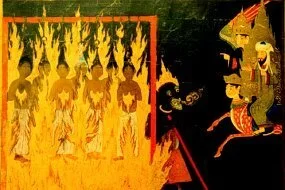Can ghosts be found within Islamic beliefs?
Islam, as a whole, does not teach the existence of ghosts or reincarnation, as many Muslims believe the Quran and Hadith do not make mention of either. The most widely accepted belief is that the spirit of a person remains in the grave until the end time of judgment. Islam does however teach about zars or spirits that typically possess women, causing sickness, rebellion and marital dischord; and jinn, typically believed not to be ghosts or angels but beings that dwell in the unseen, created before mankind, some being good, some being bad, and all created to worship God known as, Allah. The term Jinni (plural) is where our word "genie " was was derived from. Although many Muslims do not believe ghosts are found within Islam, it should be noted that a sect known as the Sufi do believe in reincarnation as well as ghosts and spirits being referenced in the Quran.
 Traditional Islamists cite that the idea of ghosts came from the pre-Islam time of ignorance and are only of superstition. When we look back at the time before the prophet Muhammed, the Jinn were an integral part of ancient Arabian religion, as they were both good and bad, influencing humans and in constant connection with wild animals, appearing often as the same. Muhammed saw jinn and mankind as separate races, both good and bad, and all under Allah. Jinn, in this light, somewhat resemble Christianity's angels and demons at play in the world, but yet, Islam teaches angels to be completely different beings from the Jinn and mankind. The ancient Greek word for spirits that were both good and bad, called daimon, seem to be a closer counterpart to the jinn.
Traditional Islamists cite that the idea of ghosts came from the pre-Islam time of ignorance and are only of superstition. When we look back at the time before the prophet Muhammed, the Jinn were an integral part of ancient Arabian religion, as they were both good and bad, influencing humans and in constant connection with wild animals, appearing often as the same. Muhammed saw jinn and mankind as separate races, both good and bad, and all under Allah. Jinn, in this light, somewhat resemble Christianity's angels and demons at play in the world, but yet, Islam teaches angels to be completely different beings from the Jinn and mankind. The ancient Greek word for spirits that were both good and bad, called daimon, seem to be a closer counterpart to the jinn.
Two Years In A Levantine Family, by author Bayle St. John, tells a credible true story of a family haunted by a ghost called an 'ifriti, which is believed to be an evil-type of jinn. The ghost was a former owner, who was guarding his riches buried within the home. Bayle St. John listened to the family's account for many years, until one day he saw the ghost appear to him in the daylight. Importantly, St. John called the ghost a shakh, and was fortunate enough to see him two more times. Shakh, or sheik, is an honory Arabic term for elder, lord or wise man. In older, traditional, Arab lore, 'ifriti clearly meant ghost, and many times referenced an angry ghost, sometimes seeking revenge for its murder.
According to Religion and Folk Cosmology, by El-Sayed El-Aswad, some muslims believe there are two types of jinn: one type being an evil jinn which is not of human origin; the second being a component of a human being and what can sometimes be seen as the ghost of a person after death. Ghosts, then, are often described negatively, as natural deaths are not believed to be a reason for negative ghosts to exist. It is believed that people who are killed (and thus their lifetime abruptly being shortened), remain as negative ghosts with ill-intentions. It is believed the 'ifrit (or ghost) leaves the body at death, and either remains in the cemetery after a peaceful death, awaiting resurrection, or in the case of people who are killed (whose life ended abruptly), wander this earth where the person formerly lived.

